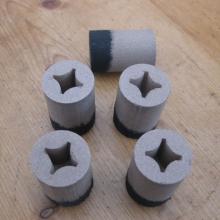A crossette star is a usually - large pumped star. It differs from normal stars in that it has a four sided cavity in one end that penetrates rather deeply, which is filled with a powerful burst charge, usually but not exclusively flash powder. The end with the cavity is capped, usually with a thick card disc glued in place, and that end, along with the sides are pasted with with a layer of paper to ensure that the crossette burns only from the other end, ensuring that the effect works as intended. An alternative method involves dipping the crossette, with end disk glued on into molten wax to fireproof it. The overall effect from a crossette shell, mine, candle or cake, is of one or more comets or bright stars which then split explosively in to a four pointed star or cross shape, thus the name 'crossette'. Crossettes usually are made with streamer compositions, though coloured ones are also common. Because they are often of a large size, and the act of splitting is violent, coloured compositions contain a high percentage of a metal fuel, usually magnalium, so that they have a high burn rate and a resistance to going out at speed.
There are a number of common malfunctions associated with crossettes. If the manufacturer does not produce a consistent batch of crosettes, they will not burst in unison. This is overcome by weighing the increment of composition added to the pump, a tedious necessity for perfect crossettes. Another common one related to the burst is a phenomenon called jetting. This occurs when the burst charge added to the cavity is not sufficient to burst it, and the result is an increase in burn speed causing the malfunctioning crossette to veer off course. An exessive burst, or more commonly an insufficient binder can smash the crossette in to more than four pieces, or even dust, reducing or ruining the effect.
While imperfect crossettes can still give a fine display, the difficulty described above is the reason that perfect crossettes are often a trademark of a skilled firework builder.

